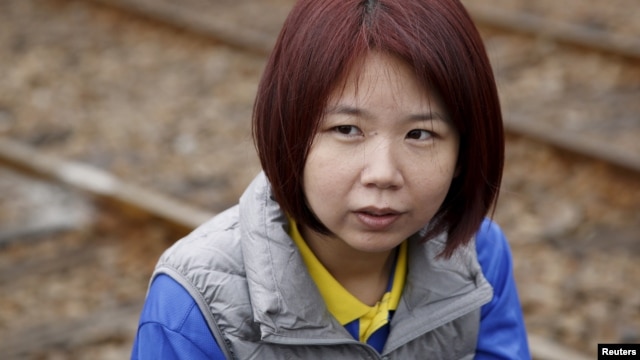Cambodian-Born Lawmaker Works for Multiculturalism in Taiwan
The newly
elected politician has been an activist on migrant issues in Taiwan for
many years, working closely with women from China, Vietnam and Cambodia.
Lin
Li-chan, once a "foreign bride" after her cash-strapped Cambodian
family married her off through a broker to Taiwan, and is running for
lawmaker in the parliamentary vote, attends an interview with Reuters in
Changhua, Taiwan, Jan. 13, 2016.
VOA | 28 January 2016
WASHINGTON DC—Cambodian-born Lin
Li-Chan this month became the first immigrant to win a seat in Taiwan’s
parliament. The country can already claim to be a frontrunner of
multiculturalism in Asia, thanks to a relatively open immigration policy
and an economy that relies on foreign workers.
But as a representative of the Kuomintang Party—which overall lost
the Jan. 16 elections to the Democratic Progressive Party—Lin pledged to
work to further migrants’ rights and integration in Taiwan.
“Not only immigrants but also Taiwanese people support my work to help immigrants integrate better in Taiwan,” she said in an interview with VOA Khmer. “This shows how Taiwanese people are learning to accept the important roles immigrants play in helping Taiwan grow economically.”
Lin hopes that her work will continue to bridge cultural and historical gaps between the Taiwanese-born citizens and immigrants and their families.
Asked about Taiwan’s open immigration policy, Lin said that it was vital to the country’s manufacturing and export-oriented economy, especially since Taiwan has one of the lowest fertility rates in the world. The country’s women have on average only about 1.12 children each, with a rate of just over two children per woman required to keep a stable population.
According to some reports, immigrants now make up the majority of Taiwan’s population of about 23.5 million. The creation of permanent residency in 1999 and a relaxation of citizenship requirements in 2014 have paved the way for many foreigners to seek employment in Taiwan.
“The Taiwanese government also provides education and skills training programs free of charge to newly arrived immigrants, to help them quickly integrate in Taiwanese society and contribute back,” Lin said. There are also scholarship and childcare programs that help young immigrant mothers attend school while their children are young, she added.
Lin arrived in the country after her family arranged for her to marry a Taiwanese man in 1997, when she was 20 years old. The newly elected politician has been an activist on migrant issues in Taiwan for many years, working closely with women from China, Vietnam and Cambodia.
Due to concern of human rights abuses and human trafficking, in 2008, the Cambodian government suspended a memorandum of understanding with Taiwan that allowed Cambodians to marry Taiwanese citizens.
Lin says she has not yet taken a good look at this issue but hopes to work on it as a lawmaker soon.
Apart from her legislative work, Lin is currently conducting research on the roles of NGOs in Cambodia. She said she hopes that her work in Taiwan’s parliament can help strengthen the relationship between Cambodia and Taiwan.
“Not only immigrants but also Taiwanese people support my work to help immigrants integrate better in Taiwan,” she said in an interview with VOA Khmer. “This shows how Taiwanese people are learning to accept the important roles immigrants play in helping Taiwan grow economically.”
Lin hopes that her work will continue to bridge cultural and historical gaps between the Taiwanese-born citizens and immigrants and their families.
Asked about Taiwan’s open immigration policy, Lin said that it was vital to the country’s manufacturing and export-oriented economy, especially since Taiwan has one of the lowest fertility rates in the world. The country’s women have on average only about 1.12 children each, with a rate of just over two children per woman required to keep a stable population.
According to some reports, immigrants now make up the majority of Taiwan’s population of about 23.5 million. The creation of permanent residency in 1999 and a relaxation of citizenship requirements in 2014 have paved the way for many foreigners to seek employment in Taiwan.
“The Taiwanese government also provides education and skills training programs free of charge to newly arrived immigrants, to help them quickly integrate in Taiwanese society and contribute back,” Lin said. There are also scholarship and childcare programs that help young immigrant mothers attend school while their children are young, she added.
Lin arrived in the country after her family arranged for her to marry a Taiwanese man in 1997, when she was 20 years old. The newly elected politician has been an activist on migrant issues in Taiwan for many years, working closely with women from China, Vietnam and Cambodia.
Due to concern of human rights abuses and human trafficking, in 2008, the Cambodian government suspended a memorandum of understanding with Taiwan that allowed Cambodians to marry Taiwanese citizens.
Lin says she has not yet taken a good look at this issue but hopes to work on it as a lawmaker soon.
Apart from her legislative work, Lin is currently conducting research on the roles of NGOs in Cambodia. She said she hopes that her work in Taiwan’s parliament can help strengthen the relationship between Cambodia and Taiwan.



No comments:
Post a Comment